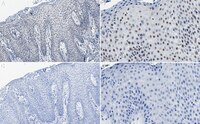MABF3074-100UG Sigma-AldrichAnti-SRF Antibody, clone 2C5
Anti-SRF, clone 2C5, Cat. No. MABF3074, is a rat monoclonal antibody that detects serum response factor (SRF) and is used in Chromatin Immunoprecipitation, Immunofluorescence, Immunohistochemistry (Paraffin), Immunoprecipitation, and Western Blotting.
More>> Anti-SRF, clone 2C5, Cat. No. MABF3074, is a rat monoclonal antibody that detects serum response factor (SRF) and is used in Chromatin Immunoprecipitation, Immunofluorescence, Immunohistochemistry (Paraffin), Immunoprecipitation, and Western Blotting. Less<<Recommended Products
Overview
| Replacement Information |
|---|
| References |
|---|
| Product Information | |
|---|---|
| Format | Purified |
| Presentation | Purified rat monoclonal antibody IgG2a in buffer containing 0.1 M Tris-Glycine (pH 7.4), 150 mM NaCl with 0.05% sodium azide. |
| Quality Level | MQ200 |
| Physicochemical Information |
|---|
| Dimensions |
|---|
| Materials Information |
|---|
| Toxicological Information |
|---|
| Safety Information according to GHS |
|---|
| Safety Information |
|---|
| Storage and Shipping Information | |
|---|---|
| Storage Conditions | Recommended storage: +2°C to +8°C. |
| Packaging Information | |
|---|---|
| Material Size | 100 μg |
| Transport Information |
|---|
| Supplemental Information |
|---|
| Specifications |
|---|
| Global Trade Item Number | |
|---|---|
| Catalogue Number | GTIN |
| MABF3074-100UG | 04065268041994 |
Documentation
Anti-SRF Antibody, clone 2C5 SDS
| Title |
|---|
Anti-SRF Antibody, clone 2C5 Certificates of Analysis
| Title | Lot Number |
|---|---|
| Anti-SRF, clone 2C5 - Q3858903 | Q3858903 |













